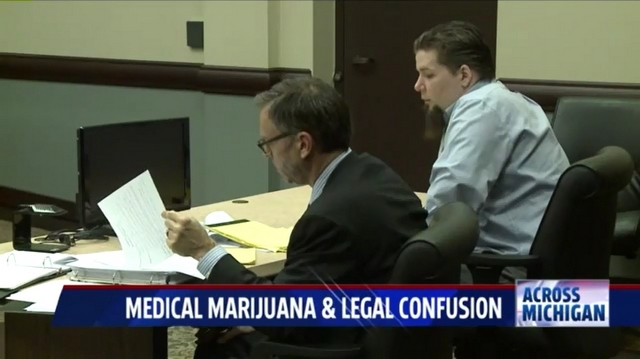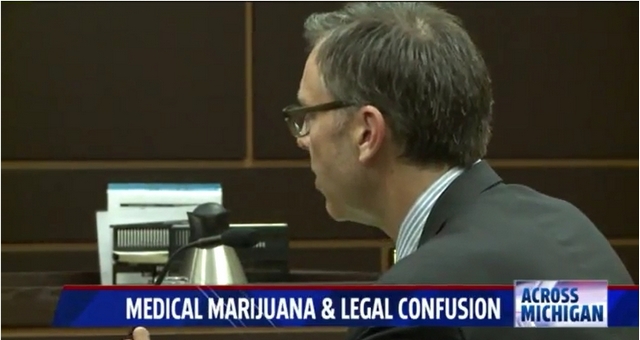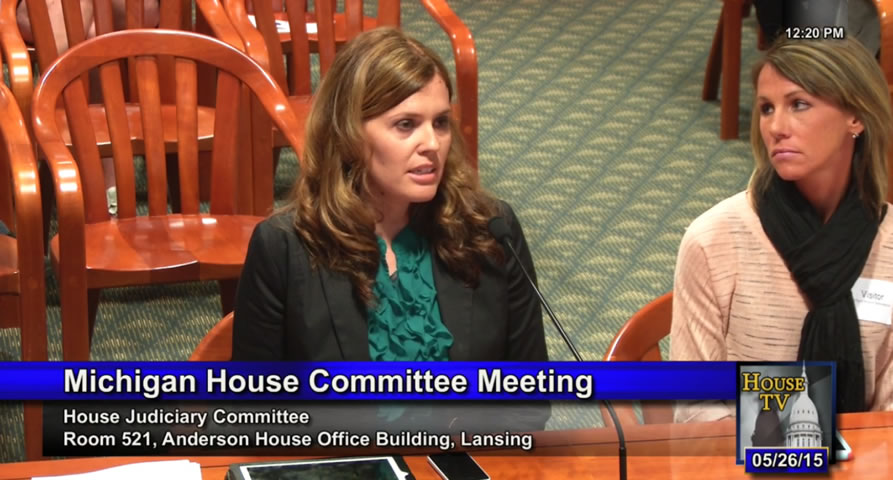
Aug 30, 2015 | Blog, Criminal Defense Attorney Michael Komorn, Medical Marijuana Attorney Michael Komorn, Michigan Medical Marijuana Act, Michigan Medical Marijuana Criminal Defense Attorney Michael Komorn, News
“Allowing medical marijuana for those with autism was supposed to be the clinical trial,” Komorn said. “Instead, we’re going to have criminal trials.”
Lawyer slams decision to deny cannabis to autistic kids
The Detroit News Article
August 28, 2015 – Lansing — Michigan’s regulatory director on Thursday rejected the use of medical marijuana for the treatment of children with severe autism.
Michigan was poised to possibly become the first state to allow medical cannabis consumption for children with severe autism when the state’s Medical Marijuana Review Panel voted 4-2 earlier this month to recommend autism as a condition that qualifies for the drug.
Mike Zimmer, director of the Michigan Department of Licensing and Regulatory Affairs, said he rejected the request because of the lack of medical evidence showing marijuana helps with treating autism. He cited the opposition from the state’s chief medical examiner, Dr. Eden Wells.
“This lack of scientific evidence is more concerning when considering the broad scope of the petition, which does not limit medical marijuana treatment to overly severe cases of autism,” Zimmer said in his four-page letter.
Michael Komorn, a lawyer who filed the petition on behalf of a mother in southeast Michigan, called the decision disappointing and misguided. He said he’s considering seeking judicial review of the decision in Ingham County Circuit Court, where a judge’s prior ruling led to the review panel decision.
“He calls out the 55 parents and calls them all criminals. How dare you?” Komorn said of the impact of Zimmer’s decision on families seeking legalization of marijuana for autism treatment. “These parents are all in because their children are sick.”
Komorn said Zimmer’s concerns about a lack of controlled trials “is the red herring we’ve been fighting for a long time.”
Parents, he said, “are coming forward with anecdotal evidence” their children are being helped. The proper starting point for a clinical trial would be allowing them to continue, Komorn said.
Dr. David Crocker, a Kalamazoo physician who recommends cannabis use for patients with chronic pain, serves on the state’s medical marijuana board and questions its purpose if Zimmer can overrule Michigan’s marijuana “experts.”
“If you’re going to assemble a panel of experts for the purposes of determining this, why wouldn’t you go with their recommendation?” Crocker said. “I thought that our advice would be heeded in this case.”
But Lt. Gov. Brian Calley, who has a daughter with autism, supported the decision.
“While I fully support finding new treatment options, there are neither sufficient studies nor scientific trials demonstrating its clinical impact to justify approval at this time,” Calley said in a statement.
Paul Welday, head of a marijuana advocacy group seeking reforms of Michigan’s medical marijuana law, said Zimmer’s decision “has met with universal disdain by virtually everyone who has been watching this issue.”
Welday said his organization, the Michigan Responsibility Council, “will be talking with our attorneys/drafters to include both autism and Parkinson’s as eligible conditions” for medical marijuana in reforms it is proposing lawmakers adopt this fall. The organization wants to work with lawmakers on pending legislation that also would set up a regulatory regime governing medical marijuana policies.”
State law doesn’t appear to allow the use of marijuana oil or juice — two methods that advocates described as ways children could take medical marijuana, Zimmer said.
He also worried that allowing autistic children to use medical marijuana could cause an explosion of use with unknown health consequences, considering the prevalence of autism in Michigan.
The director added that autistic children who experience seizures because of their condition may already be eligible to use medical marijuana as a treatment under state law.
Supporters argued oil extracted from marijuana and swallowed has been effective in controlling extreme physical behavior by kids with severe autism.
But Michigan’s 2008 voter-initiated law did not explicitly legalize oil-based cannabis products. Supporters of marijuana for children with autism said the drug could be ingested orally instead.
“The reality is there are other ways of ingesting it besides the oil form that can be just as effective,” Crocker said. “I don’t think that the fact the oils are illegal should preclude autism from being a qualifying condition.”
The panel that initially approved the use of marijuana for autistic children was influenced by comments from some Detroit-area doctors, especially the head of pediatric neurology at Children’s Hospital of Michigan, and from parents desperate for relief.
The state panel in 2012 and 2014 rejected allowing medical marijuana for autism. It led to a court battle and a challenge by Attorney General Bill Schuette before the panel accepted the latest formal request in the spring.
Article by
Gary Heinlein and Chad Livengood, Detroit News Lansing Bureau August 28, 2015

Aug 12, 2015 | Criminal Defense Attorney Michael Komorn, Komorn Law Blog, Marijuana Criminal Defense Attorney Michael Komorn, Medical Marijuana Attorney Michael Komorn
April 23, 2015 – In Western Michigan yet another Michigan Medical Marijuana patient is fighting for his freedom in a system of confusing laws. He is also fighting for the right to see his child all while the State of Michigan possibly destroys his family and financial future. Max Lorincz -unlike most who plead to the sometimes bullying tactics of the court system – is standing up for his right use the medicine recommended by a doctor.
The fly in the ointment in this case is that the marijuana was a concentrate and not what is described as usable in the Michigan Medical Marihuana Act.
The story has been covered by the Fox 17 News program. Below is some further information from the online website.

GRAND RAPIDS, Mich. – A Spring Lake father already served jail time and is due back in court for another felony charge of medical marijuana concentrates possession, despite having a medical marijuana card.
Max Lorincz told FOX 17 has suffered years of pain from a long list of ailments, including herniated back discs and severe celiac disease. Yet when he started to use prescribed medical marijuana edibles and concentrates, his pain faded.
Here’s the hook: even though Lorincz has a medical marijuana card and thought he was following the law, marijuana concentrates are not necessarily protected under the Michigan Medical Marijuana Act.
“When I got on the edibles, it was able to calm my stomach down enough and get things under control better than any medications they’d prescribe me,” said Lorincz.
Recently Lorincz was charged with felony marijuana concentrates possession. As he awaits court, the judge ordered him to be drug tested. Now he said he is forced back on powerful painkillers; pills Lorincz said make him feel like a zombie.
Under the current Michigan Medical Marijuana Act, “usable marijuana” is defined only as the dry leaves or dry flowers of the plant. Under its section four, users are protected to have up to 2.5 ounces of “usable marijuana,” Concentrates are not and according to the People v. Carruthers, don’t qualify for section 4 immunity.
Medical marijuana users can find defenses under section 8 of the act when they meet certain criteria. Prosecuting status quo tactics are usually stripping a defendant of their section 4 and section 8 immunity by any means therefore disallowing any reference of medical marijuana in a trial to a jury.
There is legislation pending that would amend the Michigan Medical Marijuana Act to include perhaps a more specific definition of “usable marijuana.” However, this House Bill 5104 has been hung up for months, after the Michigan Senate referred it to a committee last August.
Since seeing FOX 17’s coverage of Lorincz’s case back in February, Defense Attorney and President of the Michigan Medical Marijuana Association Michael Komorn took on Lorincz’s case pro bono. For the last six years, Komorn said he’s dedicated his practice exclusively to medical marijuana patient and caregiver representation.

But his case has come with some devastating consequences. In February Lorincz was charged with a two-year felony: possession of a schedule 1, controlled, synthetic substance. Schedule 1 is defined as a controlled substance that has no medical use.
Now his five-year-old son is taken away, and he is left with only supervised visits. All of this because Lorincz called 911 in September for a family medical emergency. The deputy who responded to the call found a smear of butane hash oil in his home. It’s a substance Lorincz ingests for what he called “deep pain relief,” and is something he obtained with his medical marijuana card.

“I’m outraged by it, it shouldn’t have happened,” said Komorn.
Komorn said medical marijuana is not a controlled substance. In fact, Michigan law states marijuana is a schedule 2 drug. Yet because Lorincz is charged with having a schedule 1 drug, and not specifically marijuana, Komorn said it is difficult to protect Lorincz under section 8 immunity of the Michigan Medical Marijuana Act.
Komorn believed part of the issue is a recent policy change in Michigan State Police Lab reporting.
“They had a policy change by why?” asked Komorn. “The policy changed. The motivation for it was if they report it this way, people like Max won’t be able to claim a medical marijuana defense.”
The lab technician in Lorincz’s case testified that he has been testing tetrahydrocannabinol, or THC, for 25 years. THC is the main psychoactive ingredient in marijuana, also present in synthetics. However, a recent policy change means the technicians have to write “origin unknown” when testing this type of THC on lab reports. The technician said he could not tell if the sample was synthetic or natural.
The prosecution argued Lorincz’s residue was not “usable marijuana,” as defined in the previous court case, People versus Carruthers; therefore, Lorincz should be bound over for trial. However, Komorn argued that a hash extraction comes directly from the resin of the plant.
Komorn said this lab policy change is the difference between a felony and no charge at all for Lorincz, stating he should be protected under the Michigan Medical Marijuana Act. Komorn asked the judge to dismiss it.
“(The lab technician) admitted that on the stand,” said Komorn. “That is very, very, very disturbing to me, because it means that the politics in the law are affecting the truth. That’s not how it’s supposed to be. We’re supposed to rely on science to make the case.”
For now Lorincz said he is following court’s orders and is back to taking what he calls debilitating prescription pain-killers.
Read More Detail From Fox 17 The Report Here
Also Check This Out
Prescription Pain Killers – Deaths Fall In States With Medical Marijuana

Aug 6, 2015 | Blog, Criminal Defense Attorney Michael Komorn, Medical Marijuana, Medical Marijuana Attorney Michael Komorn, Michigan Medical Marijuana Criminal Defense, News
Aug 5, 2015 – After a year long battle, Michigan Attorney Michael Komorn and his staff have chalked up another positive conclusion for a client caught up in the medical marijuana and forfeiture debacle.
Some may consider it a win, but this slow ruination of a family like so many other Michiganders… should most likely have never occurred.
What’s left to do after this… is to put the shattered pieces back together, emotionally, physically and financially. Then hope the children can go on and forget this ever happened.
The story’s beginning of the end starts here… Read on and you will find out how it began.
The Beginning of the End: Prosecutors drop marijuana charges against Michigan mom.
Prosecutors have dropped marijuana charges and will return items seized from a woman in the wake of a Michigan Supreme Court ruling last week.
“I’m elated that this part is over,” said Ginnifer Hency. “…It’s been a long year.”
St. Clair County Prosecutor Michael Wendling said about 18 cases were on hold while prosecution and defense waited on the Supreme Court decision.
“We reevaluated the files that we had pending and at least five were no longer viable in light of the Supreme Court decision,” Wendling said.
“I think that’s an analysis that prosecutors across the state are undertaking.”
The Supreme Court ruling last week clarified when caregivers and users can use their medical marijuana certification as a defense or immunity if charged with a marijuana-related crime. It was the court’s ninth medical marijuana ruling since voters approved the Michigan Medical Marijuana Act in 2008.
“We would have to have specific evidence on those items in order to overcome that burden now that we did not have to show before,” Wendling said.
Wendling said any unresolved civil forfeiture cases connected to those five dismissed cases also will be dismissed, and items seized will be returned.
The Free Press in February reported that police seized more than $24 million in assets from Michiganders in 2013. In many cases the citizens were never charged but lost their property anyway.
Komorn said Hency was arrested and her home raided in July 2014. The medical marijuana caregiver was charged in December 2014 with possession with intent to deliver marijuana.
According to appeal documents from the prosecution, Hency told a Drug Task Force member she had six ounces of marijuana in a locked bag that she intended to exchange for a different strain with another caregiver and give the marijuana to her patients.
Her case was dismissed by visiting District Judge David Nicholson in May after Nicholson found that no crime had occurred.
The prosecutor’s office appealed in circuit court. Oral arguments on the appeal were supposed to be heard by Circuit Judge Michael West Wednesday.
Hency’s lawyer, Michael Komorn hailed the dismissal.
“But that does not eliminate the horror of what they’ve had to deal with the last year,” Komorn said.
“It didn’t come easy. We’ve had to fight for a year.”
Komorn said Hency’s family was devastated by the July 2014 raid on their home and Hency has had trouble finding employment because of the pending narcotics charge.
Hency said authorities seized several items, including a Chevy Impala, two iPhones, an iPad and a ladder, when they raided her home in 2014. The mother of four, who has multiple sclerosis, told Forbes Magazine that they even took her sex toy.
Hency said she appreciated the prosecutor’s decision to dismiss the case “in the interest of justice.” But she said she feels her case isn’t completely finished.
“When I get my stuff back I will consider it over,” Hency said.
From the beginning of the end to when it started
(you should start at the bottom and work your way back up to here)
Detroit Free Press-2 hours ago
“I’m elated that this part is over,” said Ginnifer Hency. “…It’s been a long … Komorn said Hency was arrested and her home raided in July 2014.
MLive.com-Jul 27, 2015
Ginnifer Hency, a medical marijuana patient and caregiver, testifies to the Michigan House Judiciary Committee about her experience with civil …
The Inquisitr-May 30, 2015
As a mom of four kids, who also must cope with the debilitating disease multiple sclerosis, Ginnifer Hency had enough to deal with in her life …
‘Why take my vibrator?’: Michigan cops legally rob ‘every belonging … Raw Story-May 31, 2015
Explore in depth (34 more articles)
Daily Mail-Jun 5, 2015
Ginnifer Hency, 56, suffers from multiple sclerosis, a disease which causes her immune system to attack and destroy healthy nerve cells, and is …
Sex Toy at Center of Michigan Civil Forfeiture Debate Patch.com-Jun 4, 2015
Explore in depth (53 more articles)
WXYZ-Jul 8, 2015
… back in May, the House Judiciary Committee heard testimony from other victims of what Irwin calls forfeiture abuse, including Ginnifer Hency.
Washington Post (blog)-Jun 3, 2015
Just ask Ginnifer Hency. Like Annette Shattuck, Hency is a self-described “soccer mom” and a registered medical marijuana caregiver.
Vibrator taken during marijuana police raid, says woman MyFox Chicago-Jun 3, 2015
Explore in depth (3 more articles)
Mintpress News (blog)-Jun 1, 2015
Raw Story reports — Medical marijuana user Ginnifer Hency told a group of … Forbes contributor Jacob Sullum reported last week that Hency …
Armed Robbers With Badges: ‘They Took Everything’ Reason (blog)-Jun 1, 2015
Washington Post-Jun 1, 2015
June 1, 2015 10:36 AM EDT – Ginnifer Hency and Annette Shattuck, two mothers who are registered medical marijuana caregivers, testified on …
Vibrator taken during marijuana police raid, says woman
MyFOXPhilly.com-Jun 2, 2015
DETROIT (FOX 2 WJBK)- Ginnifer Hency says that police raid led investigators to seize a couple of guns, a small amount of cash and cell …
Medical Marijuana Patient Protests After House Raided, Vibrator … CBS Local-Jun 1, 2015
Armed Robbers With Badges: ‘They Took Everything’ Reason (blog)-Jun 1, 2015
VIDEO: Michigan Cops Raid Medical Marijuana Patient, Legally Rob … Mintpress News (blog)-Jun 1, 2015

Aug 4, 2015 | Blog, Criminal Defense Attorney Michael Komorn, Medical Marijuana, News
For most… a security video system is a tool to protect themselves from liability, false accusations and identify activities around their home or business. For some, such as thieves, those who make false accusations and liars…it works against them.
There can not be enough said about video security systems and how they can vindicate or convict.
That said….One should have a security system and it should be specially installed to protect you against both sides of the law.
Picture… a raid at your home or business because of something someone said or an assumption of guilt. Law enforcement will take the system (as well as anything else they desire) and claim it’s evidence. They might even try to defeat it pre-raid. Most likely you will never see it again.
You have to be prepared. You have to have it specially designed so you can retain this evidence also. It’s not the cheapest way to go but in the end it will save you a lot of time and money by protecting yourself!!! That is a fact from experience.
Picture…a break in at your home or business. Professional thieves may be prepared for security system by defeating it or simply wearing a mask. You can defeat their counter tactics in several ways. But most thieves are just opportunists and will not even notice the system.
There are also specialized alarm systems that contact only you and whoever you assign. These work very well. Sometimes that’s better than the police. In some cities who knows if they will show up at all.
Here you can research a professional and confidential installation service provider and review some systems. It is best to hire someone experienced to consult and plan before you install a system. -> Link
You can also do some research on some other posted video footage. Take note on whether you can identify someone or color or even type of vehicle. There are a lot of bad video systems and a lot of companies dumping old cheaply manufactured boxed systems with misleading specs. Also don’t be mislead by the perfect pictures on the box. It doesn’t work that way in real life.-> Link
A recent post on MLive shows a positive point…
Two teens on were caught stealing medical marijuana from a home in Brandon Township, a community in northern Oakland County.
Oakland County sheriff’s deputies say an 18-year-old man and 16-year-old girl broke into the home of a woman about 2 p.m. They didn’t take valuable items or electronics, but marijuana the woman says she has to treat medical ailments.
Fortunately she’d recently had a video surveillance system installed at her home and footage helped Oakland County sheriff’s deputies ID the suspects.

Jul 26, 2015 | Blog, Criminal Defense Attorney Michael Komorn, News, Uncategorized
July 24, 2015
Dashcam video released this week from a traffic stop shows how a confrontation between a Texas woman and the arresting officer escalated.
Given the circumstances in the aforementioned Sandra Bland case, we wanted to find out what is allowed and not allowed during a traffic stop in Michigan.
Civil rights attorney Julia Kelly says the first thing is to have a valid license, registration, and proof of insurance in your car. “Are you required to give it to them? Yes, no questions asked. Driving in Michigan is a privilege, not a right.”
The officer will likely leave you in your car and check your ID. But, if he or she asks you to get out of the car, Kelly says, you should comply. “If he asks you a lawful command to get out, you should obey those commands to get out of vehicle.”
We also asked former Flint police officer and Grand Rapids Community College assistant professor Jermaine Reese what’s expected of an officer. The driver might be smoking a cigarette, angry that they got a ticket, or using profanity.
“They can do that. They can. The biggest thing is to remain professional. No matter what they choose to call you. I’ve been called everything but a child of God, but your responsibility is that you remain professional.”
In the end, most would agree that there is a level of respect expected from both the driver and the officer. It’s better to argue the legality of the situation in court, rather than have it escalate at the scene.
Question: Do I have to comply if ordered to leave a public area by a police officer?
Answer: If you disobey a police officer’s order to leave, you may be arrested. But is the order legal? It depends on why the officer is asking. If you are disrupting traffic, on private property without permission, or otherwise breaking the law, then the order is legal. But if the officer is requesting that you leave a public space because he or she disagrees with your message, the order is not legal.
There are a multitude of laws regulating public roadways that ensure pedestrian safety and the free flow of traffic. If you break those, police can order you to leave the roadway, but you can congregate legally on the sidewalk.
Q: Can I record video of police?
A: It is legal to openly record on-duty police officers in public spaces. Some state laws may prohibit filming anyone in a public space without their consent, but there is doubt about whether those laws are constitutional. However, an officer may arrest you if you are obstructing an investigation.
Q: Can an officer search me on the street with no warrant when I am not under arrest?
A: There are limited circumstances under which an officer can search someone without a warrant who is not under arrest. They are:
- Voluntary consent. If an officer asks you for permission to search you or your possessions and you voluntarily say yes, the officer has the right to do so.
- Reasonable suspicion. If police have reasonable suspicion that you are engaged in criminal activity, they may stop you briefly. If they have reasonable suspicion that you may be carrying a weapon, they may pat you down for weapons. However, they may not conduct a full search unless they have probable cause to arrest you.
There are other exceptions for when police can search a home or a car and its passengers.
Q: How can a curfew trump my right to assemble and protest?
A: The government has the right to impose curfews in certain emergency situations to protect the lives, safety and property of citizens. However, it is unconstitutional if the curfew is imposed only to prevent a peaceable assembly.
Q: If I’m walking in public and an officer asks to speak to me, do I have to stop?
A: This is considered a voluntary encounter. The officer has the same right to request that you speak to him as any other person would, but you do not have to answer, nor do you have to stop. Ask the officer if you are free to go. If police have reasonable suspicion to believe you are engaged in a crime, they may detain you briefly to investigate.
Sources: Paul D. Butler, professor at Georgetown Law; Daniel J. Haus, attorney; Roger Goldman, professor emeritus at Saint Louis University School of Law; Orin S. Kerr, professor at the George Washington University Law School; Kenneth White, attorney
PDF Copy with Graphics

Jul 16, 2015 | Criminal Defense Attorney Michael Komorn, Marijuana Criminal Defense Attorney Michael Komorn, Medical Marijuana Attorney Michael Komorn, News
The Detroit police raided and made arrests at marijuana dispensary in an article in the Detroit Free Press from July 14, 2015.
Detroit police arrested two people and confiscated two firearms and drugs during a raid on a marijuana dispensary Tuesday afternoon.
Police seized 4,100 grams of marijuana (about 9 pounds), and removed 12 edible marijuana foods from the shelves at Detroit Medz, said Sgt. Cassandra Lewis of Detroit police Media Relations.
According to state law, only Michiganders who possess state registry cards can legally use medical marijuana, but at the shop “they were just selling to anybody who walked in,” she said.
Detroit does not have an ordinance regulating dispensaries. Detroit police favor having dispensaries be regulated, “so that it’s safe not just for the customers but also for the community,” Lewis added.
A local ordinance, spelling out what Detroit authorities expect of the city’s dispensaries, would protect legitimate operators and weed out any that are undesirable, added Southfield attorney Michael Komorn, president of the Michigan Medical Marijuana Association.
But without such regulation in place, Tuesday’s raid was ill-advised because Detroit police should focus on violent crime – not dispensaries, Komorn said.
“I can’t speak to this specific location, but there’s a lot of dispensaries operating in Detroit and it’s unfortunate that Detroit’s leaders and citizens seem to be at odds about whether they should be there. Some people still see medical marijuana as just dope,” he said.
“These places are not causing lawlessness and they’re not hurting property values in the city,” Komorn said.
Some law enforcement agencies claim all dispensaries are illegal until the state Legislature passes a law allowing them. State Attorney General Bill Schuette agrees with that assessment.
The city of Detroit is overdue for regulating its fast-spreading dispensaries, said Winfred Blackmon, a community leader in northwest Detroit who is outspoken about medical-marijuana commerce.
Read the article here Detroit Free Press Article – Detroit Dispensary Raid









